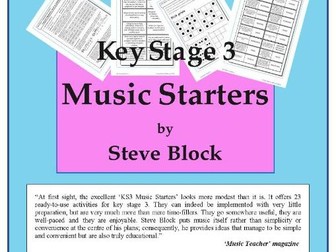Key Stage 3 Music Starters
<p><strong>Background</strong><br />
My “Key Stage 3 Music Starters” were originally produced in 2004 in book form with CDROM attached. The book, produced by Badger Publishing (now Badger Learning), went out of print several years ago. However, there has recently been a considerable renewed interest in the Music Starters online, with many requests that I re-publish them myself in digital form. Despite being unable to include the original listening starters for copyright reasons, most of the original activities and materials have been preserved, and I’m convinced that they are as relevant today as they were several years ago. I hope that you and your pupils will enjoy them.</p>
<p><strong>Introduction</strong><br />
Many music teachers already use practical ‘warm-ups’ at the start of their lessons, being aware of the importance of engaging pupils’ attention and concentration as early as possible in the lesson. The activities in this book offer opportunities not only to extend considerably the range of practical starters used, but also to introduce many other focuses and strategies at the start of<br />
music lessons. If managed well, they will provide not only pace and enjoyment but also opportunities for reviewing, consolidating, assessing and appraising - not to mention developing pupils’ thinking skills in many cases.</p>
<p><strong>About the Music Starters</strong><br />
The activities are organised into three main sections:<br />
• Controlling sounds (Practical starters, Nos. 1-10)<br />
• Creating and developing ideas (Practical starters, Nos. 11-13)<br />
• Applying knowledge and understanding (Starters 14-23)<br />
Ages or year groups have not been specified for each activity, as it was felt that teachers should make their own decisions about the suitability of the work for their particular classes.<br />
Many of the activities will work at any level (including even GCSE and above), whilst others can easily be adapted to suit different levels. In all cases, the teacher’s professional judgment is crucial.</p>
<p><strong>Key principles</strong><br />
• The activities should normally last between 5 and 10 minutes;<br />
• Careful preparation, good classroom organisation and brisk pace will be needed to ensure their success;<br />
• The starter objectives do not have to be linked to the main lesson objectives, or to the main teaching activity, though this may often be helpful;<br />
• Starters can also be used for breaking up longer sessions;<br />
• They can always be used for reviewing and consolidating prior learning, occasionally for acquiring new ideas and concepts, and frequently for developing thinking skills;<br />
• Pupils will often be asked to share their ideas and understanding in pairs or small groups;<br />
<em>• Even in a busy music lesson timetable where there may already seem too little time, starters should be considered as an investment in the pupils’ learning - never as merely a pleasant waste<br />
of time!</em></p>
